A Tribute to Ronald Hingley
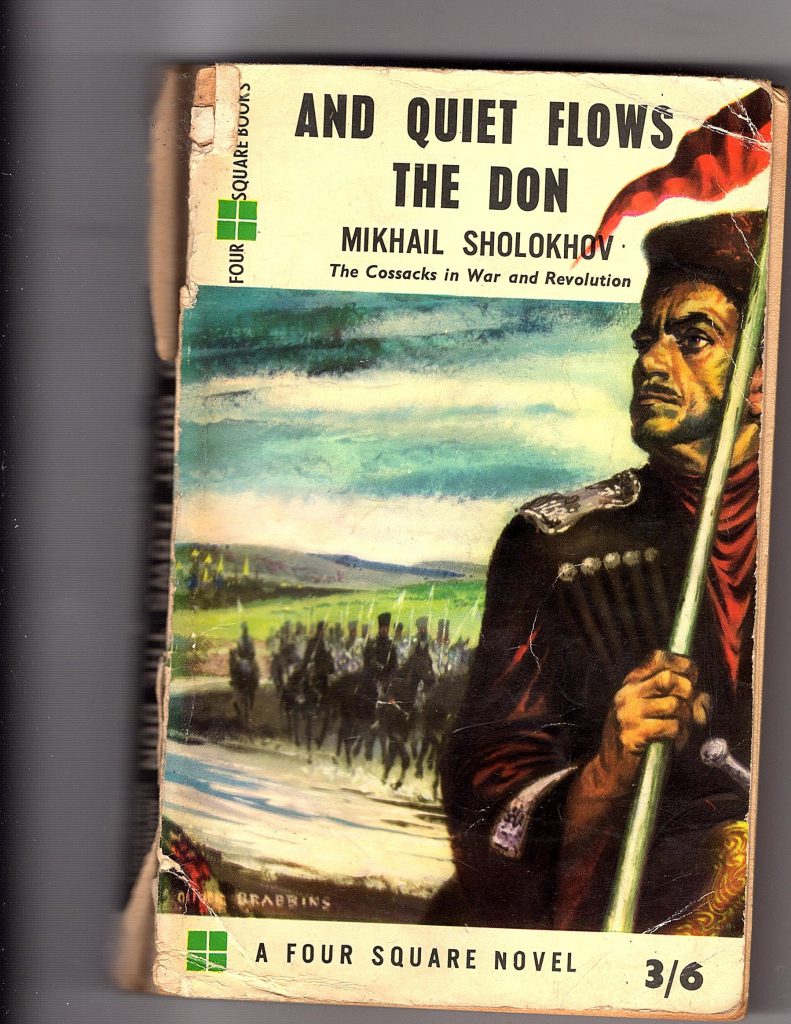
Contents:
Peter Davison: In Memoriam
Introduction
The Joint Services School for Linguists
Ronald Hingley
The Tsar of All the Russias
Hingley and Chekhov
Martin Clay
Humour in Chekhov
Hingley and Translation
Comparisons
Tarara-boom-de-ay!
* * * * * * * * * * * *
Peter Davison: In Memoriam
Before I move to the main tribute in this month’s piece, I want to pay homage to a great George Orwell scholar, Peter Davison, who died in late August. (See, for sample obituaries, https://www.thetimes.co.uk/article/peter-davison-obituary-lcnzwlfh0, https://www.theguardian.com/books/2022/sep/04/peter-davison-orwell-scholar-obituary, and https://www.nytimes.com/2005/01/01/books/peter-davison-poet-literary-editor-and-memoirist-dies-at-76.html.) I had the pleasure of visiting Peter and his wife, Sheila, at their house in Marlborough, Wiltshire, a couple of times during the 2000 decade, and he was one of the most modest and engaging persons I have ever met.
What brought me to him was my own enthusiasm for the writings of George Orwell. When I retired, and before I took up the serious study of intelligence matters, I set about reading the complete four-volume Penguin Collected Essays, Journalism and Letters, edited by Sonia Orwell and Ian Angus. As I did so, I was fascinated by the various misremembered quotations that Orwell recorded, as an activity of his jackdaw mind, and started delving into their origins, and recording the latter. The exercise also prompted me to suggest a fresh explanation for Orwell’s character and psychology, which eventually resulted in the unpublished article Orwell’s Clock (see https://coldspur.com/reviews/orwells-clock/), that itself anticipated a more authoritative analysis by Professor Michael FitzGerald.
I wrote to Mr. Davison, submitting the fruits of my researches, and he replied enthusiastically. He eventually used much of my work in his 2006 publication The Lost Orwell, which was a supplement to the massive twenty-volume Complete Works that appeared under his editorship in 1998. (I have most of the volumes in a special bookcase.) Among other fascinating pieces, The Lost Orwell contains Orwell’s controversial list of Crypto-Communists and Fellow-Travellers that he sent to the Foreign Office’s Information Research Department in May 1949. In his Foreword, Davison wrote:
Mr Antony Percy sent many pages identifying passages to which Orwell referred. He had worked from the four-volume Collected Journalism, Essays and Letters and had not then seen the twenty-volume edition which did identify many of these passages. However, there were many that were unknown to me and I am grateful to him, as I am to all those who wrote with suggestions.
I am proud of my contribution to Orwell scholarship, and it was an honour and a great pleasure meeting and working with Mr. Davison.
* * * * * * * * * * * *
Introduction
When the first volume of Mikhail Sholokhov’s novel Tikhy Don came out in translation in the 1930s, it bore the title And Quiet Flows the Don. The publishers presumably thought that prospective readers might think that a book given a literally translated title of The Quiet Don would be about a shy Oxford academic, or even a recalcitrant Spanish nobleman, rather than an emblematic Russian river that quietly went about its business as the Cossacks became engaged with the rustic brouhaha of the Russian Revolution beyond its banks. I dedicate this article to Professor Ronald Hingley, an apparently reclusive academic, who taught me so much about Russian history and literature, about good essay-writing, and about the art of translation.
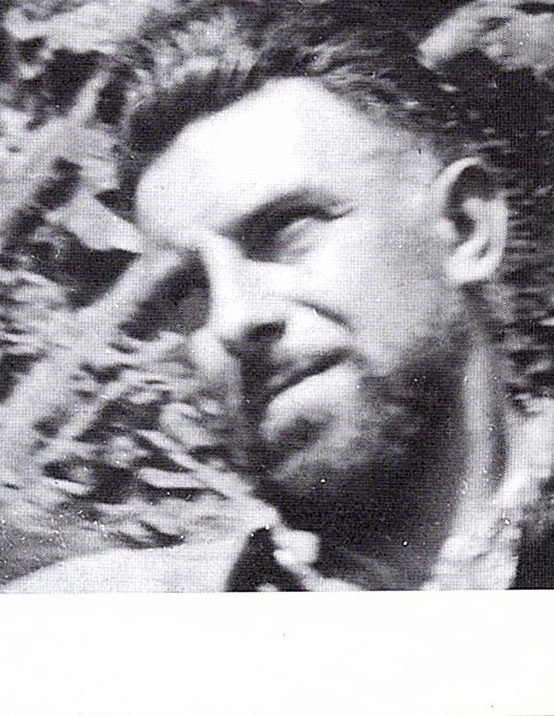
This Quiet Don was my primary Russian tutor at Oxford, and had a stellar career as a student of Russian history and literature, and, in particular of Anton Chekhov. Surprisingly, he died with little recognition in 2010. Only recently has a Wikipedia entry been created for him, and it is remarkably thin. The Oxford Dictionary of National Biography has no entry for him. Yet his influence and achievements are great, if only for his unreserved opposition to the monstrous Communist regime of the Soviet Union. He fell into great disfavour with the Soviet authorities, because of his merciless descriptions of the horrors they defended, and was thus presumably an exasperating ‘noise’ in their ears.
While his career appears to have been largely ignored, I suspect that those who were taught by him will recall his contributions and presence very acutely. He always appeared as a very intense, but restrained, figure in the tutorials and classes that he led at Oxford when a fellow at St Antony’s. He had a goatee beard, and pince-nez spectacles, I recall, that gave him the mien of his literary hero – an effect surely intended. He stood out as the leading academic in Russian at Oxford. Professor Fennell was a respected name, but I don’t believe he taught undergraduates, and his specialty was early Russia. I recall attending just one of his lectures. I did have tutorials with Mark Everitt, a priest at Merton College, attended lectures by T. J. Binyon, and probably some by Paul Foote. I also underwent some conversational sessions with a Mrs. Willets – who turns out to have been a Pole married to the historian E. T. Willets. She was a lovely lady, but now I understand why she was a bit puzzled about some Russian constructions, since it was not her first language. If there were other Russian dons, they must have avoided me.
The Joint Services School for Linguists
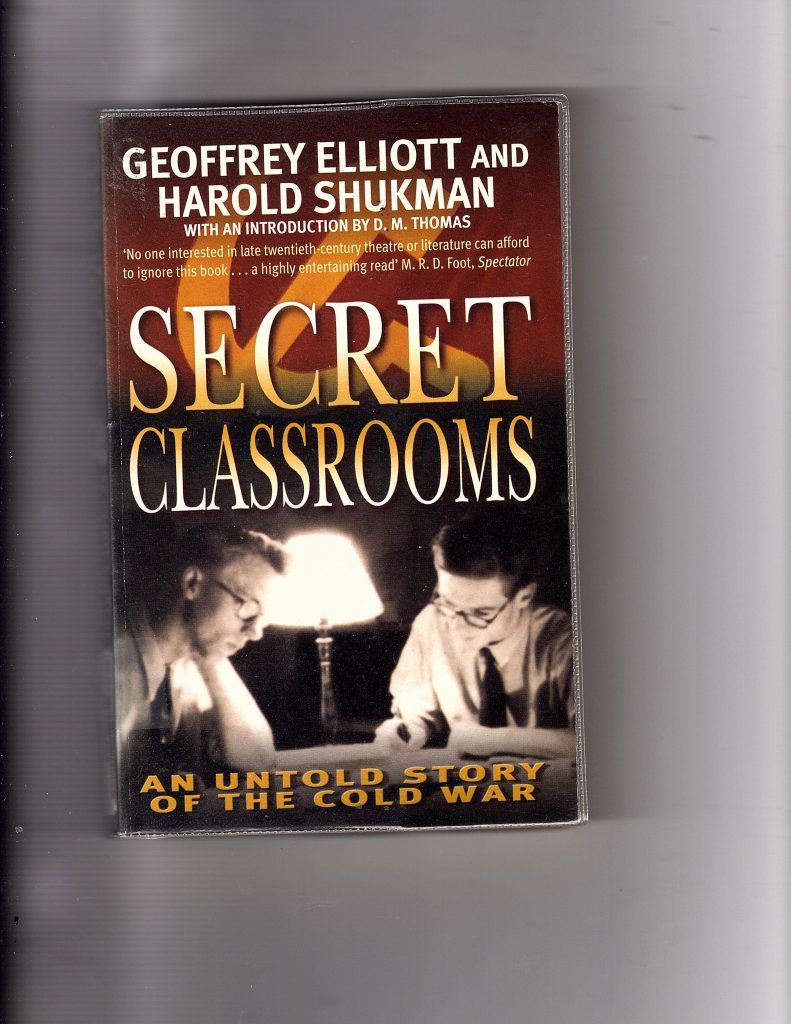
Geoffrey Elliott wrote about Hingley in Secret Classrooms, the brilliant book he co-authored with Harold Shukman about the Joint Services School for Linguists (JSSL) that operated from 1951 to 1960, training students to become fluent in Russian, as part of their National Service. The blurb on the back describes it as ‘the enthralling and previously untold story of this one-of-a-kind British accomplishment, a heady mix of a high-powered college and a Chekhov play’. That was perhaps not entirely fortuitous, and a rare photograph of the first JSSL course administrator in London, Ronald Hingley, appears in the book. The list of alumni is an illustrious one, containing names such as Michael Frayn, Alan Bennett, Gervase Cowell, Ian Harvey-Jones, D. M. Thomas, Paul Foote, and Dennis Potter.
One famous name overlooked in Secret Classrooms, but hinted at obliquely, is that of Tom Springfield (born Dionysius O’Brien), the songwriter and founder of the Springfields, sister of Dusty, who died this last August. He attended the JSSL school in Coulsdon, and was responsible for compiling a volume called The Samovar Songbook, which is mentioned on page 110 of the book. It is worth presenting the commentary of Elliott and Shukman, delivered with true Hingleyesque verve:
First introduced at Coulsdon, and edited by the kursanty with staff help, it ran to two editions and included folk melodies, and melancholy and passionate pre-Revolutionary gypsy cabaret songs of the sort that aroused Rasputin to priapic ecstasy. There were Ukrainian nonsense songs, the Russian equivalents of Christmas carols, songs sung by wagon-drivers on the steppes, boot-stamping Cossack choruses and more doleful chants of prisoners and Tsarist army conscripts, as well as some of the basso-profundo lyrics popularized in the post-war years by the Red Army Choir when they were not busy crushing East European uprisings.
One can almost imagine Chekhov singing along on his trek across Siberia to Sakhalin, and Springfield’s contribution is almost a let-down. He simply based the award-winning song The Carnival Is Over (recorded by the Seekers) on a nineteenth-century Russian tune known as Stenka Razin, after the seventeenth-century Cossack rebel. Some carnival.
Yet Elliott’s first task was to differentiate Chekhovian Cambridge from the more industrious London. The first two schools were set up in Coulsdon, Surrey (the town where I lived until 1956, but the school was way over the other side of the valley, behind ‘The Fox’ public house, near Caterham Barracks), and in Bodmin, Cornwall. When the pupils had passed their tests in these establishments they were sent on to one of two university schools, in Cambridge and in London. Professor Elizabeth Hill led the course at Cambridge, and Ronald Hingley that in London. There was considerable strife between the two, as Hingley believed that he had taught Hill about the best use of pedagogical techniques, while Hill looked down on Hingley because he was merely a lecturer in the School of Slavonic Studies.

Hill had an exotic background: she was the daughter of ‘a once prosperous Scots-Russian merchant family in St. Petersburg’, and was also the niece of General Miller, who had commanded the anti-Bolshevik White Army in Northern Russia, and in 1936 was kidnapped in Paris and killed by the NKVD. The fact that British intelligence officers were learning Russian at the School of Slavonic Studies in London came to the notice of the NKVD illegal rezident Alexander Orlov, who put Guy Burgess on to investigating what was going on. The leak probably issued from Professor Haldane. Elliot and Shukman reveal some fascinating glimpses into the intelligence exploits of Hill’s extended family (although George Hill, of SOE’s Moscow mission, was not one; Guy Burgess mixed him up with George E. Hill).
Elliott and Shukman wrote that ‘learning advanced Russian under Liza and her team at Salisbury Villas was rather like being at a high-intensity crammer run by a distinctly odd extended Chekhovian family’, and they contrasted the atmosphere in Cambridge with that in London as follows:
If Cambridge was Chekhovian, London’s tone, set less by the shadowy George Bolsover than by its first director Ronald Hingley, might best be called ‘Stakhanovite’, if anyone now remembers that persistently overachieving worker who became a propaganda item of the Soviet era. But it was far from grim, and it achieved results.
In his Introduction to Secret Classrooms, the poet, playwright and translator D. M. Thomas echoed this idea, by recalling how his class at Cambridge was told by Liza Hill to ‘rabotat’, rabotat’, rabotat’ – work, work, work’, ‘and if we did, we would fall in love with ourselves’, which echoes Irina in Three Sisters, committing to work as a relief from her suffering, or Voynitsky in Uncle Vanya, encouraging Sonya that they must ‘work, work’, before they both sit down at the table to check some ledgers – certainly not the type of toil extolled by their Communist successors.
Ronald Hingley
While Hingley might not have appreciated his approach being dubbed ‘Stakhanovite’, his own dedication and commitment to excellence were unrivalled. Moreover, it was here that his opposition to Stalinism became more public, thus incurring the wrath of the Soviet Union. He was particularly scathing about the founder of the British Communist Party Andrew Rothstein, who had greatly influenced the culture at the School of Slavonic Studies, and Hingley characterized the School, in recognizable Hingleyesque style *, as ‘a nest of poisonous Kremlin-fanciers’. It was Rothstein who recruited Melita Norwood, the atom spy whose exploits have been publicized in The Spy Who Came In From the Co-op, a book that Hingley would have derided for its obvious ‘padding’ (a feature of essay-writing that, in my tutorials with him, he strongly advised me to eschew.)
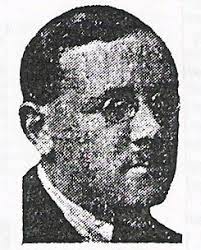
[* In Misdefending the Realm (p 220) I quote Hingley from his book, The Russian Secret Police: “On 19th December 1967 the same newspaper [Izvestia] published an article Hello, Comrade Philby, quoting the veteran master-spy in praise of Dzerzhinsky as a ‘great humanist’ – the formula commonly applied in Soviet parlance to successful sponsors of mass killings.” (p 249)]
The authors add some important facts about Hingley’s career. He had joined the School in 1947 as a lecturer ‘after a war which included service with the 21st Army Group, SOE and a brief spell at Bletchley Park, where, he was told, he was the first to break a Soviet code; he declined an invitation from one of its leading lights, John Tiltman, to work there.’ I knew about the spell in SOE, since I had discovered Hingley’s name in the archives of the Russian Section, but Bletchley Park surprised me. The reference explicitly states Bletchley Park, not the establishment at Berkeley Street in London under Alastair Denniston that processed diplomatic and Comintern traffic after 1942. The sequence of these duties suggests, however, that Hingley moved to Bletchley Park after his time at SOE. The Russian section of SOE was not established until after Barbarossa (June 1941), while the Bletchley Park project on Soviet ciphers was reportedly terminated in December 1941, but in fact secretly handed over to a Polish group (according to what Ralph Erskine and Michael Smith claim in The Bletchley Park Codebreakers). Perhaps that is further evidence that, contrary to what Harry Hinsley claimed about Churchill’s order that no more work on the decrypting of Soviet traffic should continue after Barbarossa, it did indeed carry on with some British contribution.
The Tsar of All the Russias
I thought of Hingley when I was speaking to Anatol Shmelev (of the Hoover Institution) this last June. At some event, whether during a private tutorial or at his class in Soviet prose translation, I recalled clearly when Hingley had declared that the famous phrase ‘tsar of all the Russias’ (which appears in many history-books and encyclopaedias) was a misnomer. The source (he claimed) was not the imagined original Russian wording ‘tsar vsey Rossiy’ (genitive plural of ‘Rossia’) but ‘tsar vsekh Rossii’ (the tsar of everyone of Russia, genitive singular), which perhaps made more sense, as, apart from White Russia and Little Russia, what other Russias were there in the Russian Empire?
This conundrum has occupied my mind occasionally over the years, but I did not know whom to turn to. Yet it endured, like two other linguistic traps that I have encountered from time to time, both in German: ‘The Old Contemptibles’ and ‘Deutschland Über Alles’. Kaiser Wilhelm II was supposed to have referred to General French’s regular British Army in 1914 as ‘a contemptible little army’, but in fact what he wrote was ‘a contemptibly little army’, where the adverb qualifies the adjective. A letter to the Times in July 1974 explained that what the Kaiser wrote was ‘eine verächtlich kleine Armee’, not ‘eine verächtliche kleine Armee’. As for ‘Deutschland Über Alles’, several observers have interpreted the German anthem as expressing a desire that ‘Germany should be over everything’ (thus implying imperial domination), when in fact it means ‘Above all, Germany’, using the accusative case, not the dative, implying the slightly more subtle message that Germany should have precedence over any other loyalty. ‘Germany over everything’ would be ‘Deutschland Über Allem.’
Thus, when I encountered Anatol Shmelev, born of Russian parents in the USA, and a keen student of tsarist history, I decided to ask him. His first response was that he would look up Hingley’s book The Tsars, but he also dug out a fragment about Ivan the Terrible, presumably in Old Russian or Old Church Slavonic, which represents that Ivan was known as the tsar ‘vseia Russii’. Page 29 of Hingley’s book appears to echo that assertion, stating that Ivan the Terrible ‘made a practice of calling himself ruler ‘“of all Russia”’. That surprised me as a third variant: why would any dictator have to describe himself in those terms, as if there were a possibility that his domain did not extend throughout the entirety of Russia, whatever its geographical boundaries? And what happened to Hingley’s lecturette to his pupils about ‘everyone of Russia’?
I have just started reading Antony Beevor’s book on the Russian Revolution (Russia: Revolution and Civil War, 1917-1921), and I notice that, in describing the Tsar’s unconstitutional abdication in favour of his brother, Archduke Michael, Beevor writes: “The first thing the reluctant Tsar insisted on dropping was the standard formula: ‘We by God’s mercy, Mikhail II, Emperor and Autocrat of all the Russias’”. Beevor vaguely notes Donald Crawford and Richard Pipes as his sources. The mystery remains unsolved.
Hingley and Chekhov
No matter. I reflected further on Hingley. I remember his telling me that he had been educated at Kingswood School, in Bath, and that he was a contemporary of C. W. C. (‘Bill’) Edge, who was a history teacher at Whitgift throughout my time there. (They both left Kingswood in 1937: Hingley won an open scholarship to Corpus Christi College, Oxford.) I happened to think that Edge was an appalling history master, but I know that my friend Nigel Platts (who studied History at Oriel College, and went up to Oxford a year before me), thought highly of him. Many teachers at Whitgift were very effective in leading small, well-motivated classes, but often struggled with a larger, diverse set of pupils, and Edge was perhaps one of those. Hingley’s reputation as an historian and translator was secure, however. He edited the standard edition of Chekhov’s works known as The Oxford Chekhov, and it is those editions that I want to turn to next in this bulletin.
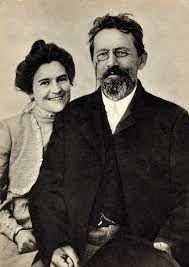
I had coincidentally been re-reading Hingley’s translations of Chekhov’s plays, in the Oxford University Press paperback editions, earlier this year, perhaps triggered by my reading of Paustovsky, who covered the same era in Ukraine and Crimea about which Chekhov wrote. And I had been thinking how these dramas were presented to us callow schoolboys in the early 1960s. (I was not aware at the time that Chekhov’s wife, the actress Olga Knipper, had died in 1959, only a couple of years before I started learning Russian, fifty-five years after her husband. She had acted the role of Masha in Three Sisters: moreover, Masha was based on the character of Chekhov’s sister, Masha, who died in 1957. Quite extraordinary.) The translations we used at school had been the Penguin editions by Elisabeta Fen, and I recall being rather surprised that they were described by the playwright as ‘comedies’, as I did not at the time find much humour in them. Was that a fault in Chekhov’s conception, a failing in the translator, a misunderstanding by directors of his plays, a deficiency in the schoolmaster who guided us through them, Martin Clay, or was it due to an immaturity in the heads of us fifteen- and sixteen-year-olds?
When I re-read, as a seventy-five-year-old, the Hingley versions of The Seagull, Uncle Vanya, Three Sisters and The Cherry Orchard (which I had read in 1967, since they still hold my pencilled annotations), I decided that all except the first explanation were true. I had seen a few productions of the plays in London during those late 1960s and early 1970s which tended to reinforce the notion that there were not many laughs to be found in Chekhov’s drama. I believe this misunderstanding had several roots: the plays were ‘classics’, after all, and ‘classics’ were supposed to be serious, earnest. And there existed the mythology about the Russians – they were a gloomy people, with a mystical and mysterious soul, and oppressed by all manner of existential and religious demons. Russia in the 1890s was not a period for comedy.
This mythology has endured. William Boyd, writing about the novelist William Gerhardie in The Spectator World of August 2022, refers to Gerhardie’s ‘Chekhovian outlook’ that reflects his conception of the ‘humorous tragedy’ of the human condition, and Boyd takes time to remind his readers that Chekhov ‘famously subtitled The Cherry Orchard “a comedy”’, as if the playwright’s intentions had been deceptive and subversive. Yet I doubt whether Chekhov would have acknowledged that his plays were about ‘the human condition’, whatever that meant. He would have found it all frightfully pompous.
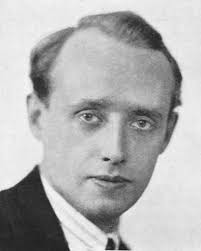
(I went back to Gerhardie’s book on Chekhov, written in 1923 as an outgrowth of his B. Litt. thesis at Oxford. It spends much more time on Chekhov’s stories, and his notebook, than it does on the plays. I found it insightful, but a bit too flowery and abstract for me – which it probably was for Hingley, too. I recall Hingley talking disparagingly about critics who try to generalize their opinions by referring presumptuously to the manner in which ‘we’ react, and it could well have been Gerhardie he had in mind, since he makes many such declarations. While I detected much metaphysical nonsense in Gerhardie’s work, also, it does contain some choice phrases, such as: “But if pressed to do so, I would rather say that Chekhov’s outlook in a nutshell was that he thoroughly distrusted nutshells.”)
Hingley himself offered an explanation of the comedic aspect in his Introduction to his translations (The Oxford Chekhov, Volume 3), when he wrote:
The fact is that you find as much humour in Chekhov’s plays as you are qualified by your own sense of humour, or assisted by skilled interpretation, to find. The plays, like many of the stories, are built on tension between the humorous and the serious, so that it is not really possible to assess the extent to which they are serious – quite apart from the fact that ‘humorous’ and ‘serious’ are not concepts which necessarily exclude each other.
Martin Clay
I do not think that Martin Clay, who taught us Russian and German, really understood this distinction. He was a forbidding and strict individual. That discipline was reasonably effective when he was teaching Russian grammar, although his techniques sometimes left something to be desired. When pushing his pupils on translation, he would sometimes urge them to make a stab at some elusive word: ‘Save Your Life!’ was a frequent invitation for inspiration. When one of my classmates struggled with the word ‘ploog’ (meaning ‘plough’), and, when forced to save his life with a guess, came up with ‘plug’, he was immediately humiliated by being told ‘Don’t make stupid guesses!’. His life was presumably not spared. Thus were adolescents encouraged to learn in 1961.
And Clay’s querulousness let him down in more subtle environments. I recall composing a short story, in Russian, on a journey into space – a theme he had set us – and I decided to place my narrative in some future time when space travel was so routine that the craft was able to alight on the wrong planet, to the relative dismay of the crew, as if, on a day-trip, they had landed up in Eastbourne instead of Brighton. I was quite pleased with my confection, but when the stories were returned in class, Clay accused me of being ‘frivolous’, and reamed me out, as if I had personally insulted him. I am not sure what the punishment would have been, but, fortunately, he decided to pass my work by his colleague Tom Savage, like him a graduate of the JSSL, for a second opinion. Clay then had to back down, since Savage (who I knew disliked me) found the theme quite amusing and inventive.

It was not that Clay could not enjoy any jokes, but you had to be careful not to smirk at any of his more extreme utterances. When he arrived at Whitgift to teach us Russian in 1961, he was not immediately allocated a permanent classroom, and we had to walk down to the cricket pavilion for our lessons with him. On one memorable occasion he reported to us on the lack of progress towards a regular and durable home: “Space has not yet materialized”, a paradoxical and highly philosophical observation that I found supremely amusing. I had to suppress my smile, as Clay would not have relished the explanation for my mirth. I didn’t think of it at the time, but it occurs to me now that it was something that Solyony in The Three Sisters might have said.
Humour in Chekhov
I privately found some of the situations and lines in Uncle Vanya (our set A-Level text) quite amusing. When, in Act Four, Marina informs the audience, with a sigh, that ‘I haven’t tasted noodles for ages, old sinner that I am’, the juxtaposition of sinning with such a bland food as noodles (not that I knew what they were in 1961) made me laugh out loud, and I recall regaling the members of the Percy family with the anecdote at dinner-time that day – to be met with rather an awkward silence. But perhaps I was not supposed to find that funny, and it was my sense of humour that was at fault. These were fin de siècle Russians, after all, and Sin, and the role of noodles in their diet, what with all those strange Orthodox Church practices, was perhaps part of a ritual that I did not understand.
Moreover, much of the plots of Chekhov’s plays revolve around jealousy, unhappy marriages, adultery, infidelity, and thwarted passion. This was not a subject for humour for many schoolmasters, who would have found it difficult to discuss such matters with adolescents. (I have written beforehand about the embarrassing details of Gretchen’s seduction by Faust in Goethe’s great work, and how John Chester was very uncomfortable talking about the circumstances and outcomes.) Poor Martin Clay was betrayed (like the schoolmaster Kulygin in Three Sisters) when his wife ran off with another master, and thus tensions between spouses might have been something he wanted to avoid discussing in class.
And what did we youngsters know about such things? How could we possibly write essays about these dramatic situations, given our inexperience? When Vanya declares his love for Helen Serebryakov, the Professor’s wife, I probably imagined that was how Russians actually behaved all the time – rather like the French, I suppose – while we English would behave much more staidly. Our view of romantic affairs would be sustained more by the very suppressed passions of Brief Encounter, or the later image of Lady Antonia Fraser being captivated by Harold Pinter at a party, and mildly requesting of him ‘Must you go?’. Thus there was a tendency to interpret all the ambiguous statements of the cast in Uncle Vanya as serious reflections of the Russian character, and not as symptoms of comedic conflict.
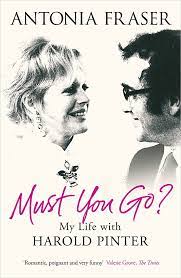
The critical emphasis that Clay encouraged consequently focused on those great Russian themes: ‘the superfluous man’ (lishny chelovek), as in Lermontov and Turgenev; ‘laughter through tears’ (smekh skvyoz slyezi), as in Gogol; ‘the tortured Russian soul’, as in Dostoevsky; ‘the sweep of historical fate’, as in Tolstoy, since the landowning class awaits the apocalypse; the untranslatable concept of ‘poshlost’ (a mixture of smugness and condescending vulgarity); or even on what was supposed to be Chekhov’s unique contribution, the creation of mood (nastroyenie), via such devices as distant breaking strings that may have been indicative of untold mining disasters. This was presumably what the examiners wanted their entrants to be taught about, and that is therefore what we learned to regurgitate. (I suspect that today Astrov’s plea for preserving the forests would be adopted as an early Save the Planet campaign.) Such interpretations were consonant with some early stagings of the dramas. Chekhov was distraught when he discovered that the director Stanislavsky had decided, in his absence, that his last play, The Cherry Orchard, should be presented as a tragedy.
It was Ronald Hingley who drew my attention to all the humour in the plays, and, when I recently re-read them after more than a fifty-year gap, I found fresh evidence. Chekhov was a doctor, but it does not stop him being satirical about his profession. This characteristic derived from his own career as a doctor: in 1886 he wrote a letter describing a wedding where he was going to be best man: ‘a doctor is marrying a priest’s daughter – a combination of killer and undertaker’. And he occasionally betrayed the fact that he was not averse to the occasional quack remedy himself, as when he advised his sister, Masha, in 1898, in response to her recurring headaches ‘to abstain from alcohol, tobacco, fish, to take aspirin, then subcutaneous arsenic, potassium iodate and electric shocks, and if that doesn’t help, then wait for old age, when all this will pass and new diseases will start’ (Rayfield, p 464). The evidently durable Masha survived afflictions far worse through the Revolution, the Civil War, the Purges, World War II, and the generic horrors of Communism.
In the first minute of Uncle Vanya we are introduced to Astrov, clearly identified as a doctor by Marina, and the second thing he says is: ‘No, it’s not every day I drink vodka’ – the vodka-doctor presumably being the Russian equivalent of Graham Greene’s whisky priest. Dr Dorn, in The Seagull, a womanizer but a sympathetic character, casually suggests valerian drops as a remedy for any ailment that his friends undergo. In Three Sisters, Chebutykin confesses that ‘they think I’m a doctor and can cure diseases, but I know absolutely nothing’. He had been responsible for the death of a patient a few days before, and now copies out remedies from a newspaper article. Donald Rayfield wrote that The Cherry Orchard ‘is the progenitor of modern drama from Artaud to Pinter’. The plays also reveal a road that leads to ‘Doc’ Morrissey of Sunshine Desserts in The Fall and Rise of Reginald Perrin.
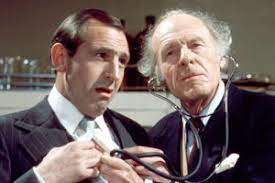
Another classic is the exchange between Chebutykin and Solyony in Act 2 of Three Sisters, where they have a pointless debate about the essence of two Caucasian dishes (a dialogue that raises some interesting aspects of translation, as I shall explain below). They talk at utter cross-purposes, apparently because of a misunderstanding over similar-sounding words. But the tenor and effect are exactly like Monty Python’s Argument Clinic. And I offer another example: the masterly transition from the end of Act 1 to the start of Act 2 in Three Sisters, where the beguiling and adored Natasha suddenly appears as an exploitative termagant, is hilarious.
I could cite more but the point is that the plays are strewn with self-absorbed characters who simply do not listen to what others are saying to them. Chekhov loves to show the delusional facets of mediocre people who try to convince themselves that they are original or interesting, in order to provide themselves some sense of self-worth. These characters frequently display eternal facets of behaviour that are instantly recognizable in any era or location: the passive/aggressive emotional manipulation by Arkadina of her son, Konstantin, in The Seagull; the grouchy victimhood of the indulged Professor Serebryakov and the vanity and frustrated ambitions of Voinitsky in Uncle Vanya. On reading Donald Rayfield’s outstanding 1997 biography of Chekhov, I realized how much of such behaviour had originated from Chekhov’s observation of his close family and friends, especially his self-pitying father, Pavel, and his selfish oldest brother, Aleksandr.
One would not be able to detect what a bohemian, even bawdy, life the young Chekhov led from his more restrained publications, and for a long time the seamier aspects of his life were withheld, thus contributing to the notion that the writer was a sober and earnest gentleman who needed to be taken very seriously. (What is remarkable is that the four great plays were written when Chekhov suffered regularly from haemorrhaging of the lungs, the symptoms of tuberculosis that he knew would kill him before long. It is breathtaking to consider the equanimity and humour with which he endured the last few years of his life.) For example, when I first encountered Voinitsky’s declaration that he ‘could have been a Schopenhauer, a Dostoevsky’ I took it all rather literally, deeming his presumptions legitimate: it needed a few more years for me to perceive the absurdity of such claims. After all, Chekhov might have thought that Schopenhauer was a frightful charlatan or a windbag, and who would have wanted to live the life of Dostoevsky, what with that mock execution, and those gambling obsessions?
I believe part of the problem with Chekhov’s stage humour is that the rest of the cast does not seem to be encouraged to break out into guffaws when the more absurd speeches are made, and the lack of reaction tends to diminish the level of humour in the audience’s eyes and ears. That is one reason why actors have complained that the dramas do not lend themselves to proper ensemble acting. (Gerhardie wrote: “The company on the stage, as indeed in life, is to all purposes an ensemble of solitary souls.”) The cast members must wonder what what they should be doing when (for instance) Gayev makes his speech honouring the bookcase in The Cherry Orchard. At my first reading I must have thought to myself: ‘That is what Russians do. They address inanimate objects in emotional terms’. But even in rural Russia in 1900, any normal acquaintances of Gayev would have interrupted the fellow after a few words in the hope of being spared any further embarrassments, or at least rolled their eyes, shaken their heads, thrown their hands up in the air, or gesticulated to him to stop.
Hingley and Translation
Hingley set much store in the art of translation, a topic that still fascinates me. He took a class in Russian prose, and we used his book Soviet Prose, which included some rather dire extracts from ‘socialist realist’ writers. Tackling these pieces presented the familiar challenge of trying to find the correct English words to represent characteristics and events that were relatively contemporaneous, but still far removed from familiar 1960s Britain. Yet, with Chekhov’s settings, the problem was far more intense. How faithful should a translator be to the original? What manner of the English vernacular should be applied to the speeches of a variety of Russians in the 1890s? Should a translator try to be very faithful to the idioms and references of the time and place? Should the leading characters perhaps talk like Galsworthian land-owners and gentlefolk? Or should the exchanges be packaged up – a little distorted, possibly – for a modern audience?
Hingley explained his approach in his Introduction to Volume 3. He set out to produce versions for the stage – a goal that might appear to be obvious – but added that his versions were intended for reading as well as acting. Yet, since his opinion was that the best stage version ‘must automatically be the best version for reading purposes as well’, his distinction could be seen as superfluous. He went on to write:
An attempt has been made to use modern English which is lively without being slangy. Above all, an effort has been made to avoid the kind of unthinking ‘translationese ’ which has so often in the past imparted to translated Russian a distinctive, somehow ‘doughy’ style of its own with little relation to anything present in the original Russian.
Now I might challenge Hingley a bit on his terminology. It puts me off a bit that the two key words in this second sentence are both encapsulated in inverted commas, as if they are not real terms. Why are there not proper English words to describe what he wants to communicate, and, if they are not proper English words, how is the reader supposed to interpret them? The word ‘translationese’ does not appear in my Chambers Dictionary, but on-line dictionaries define it ‘as an over-literal approach to translation’ and state that the term originated in the early 20th century, so Hingley could presumably have used it without quotation marks. And, admittedly, he gives examples: the Russian verb ‘filosoftsvovat’’ is used much more freely and vaguely than a native English speaker would deploy ‘to philosophize’ (perhaps ‘shoot the breeze’?), and Hingley does not always translate ‘dusha’ as soul, given that the word (according to his estimation) ‘is now almost confined to theological contexts’. One could confidently conclude that Hingley was not a fan of Arthur Conley.
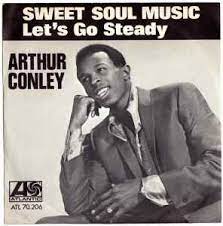
But ‘doughy’? The word means ‘pallid’ or ‘pasty’, but I would assume that Hingley was suggesting more ‘lumpy’, or ‘indigestible’ even. I think I know what he meant – where the language neither reflects an accurate rendering of the original, nor sounds like the idiom or register of what any normal person would naturally express. And this is a very important point. He goes on to explain how Chekhov uses French forms of address ‘to create an antipathetic, vulgar, “genteel” [those quotation marks again!] (or one might wish to say “pseudo-genteel” effect), a system that will not work in an English setting.’ He follows up with:
It would be a mistake for an actress to pronounce these French sentences with a good Parisian accent. On the English stage they would probably sound best spoken in some suburban English accent, which, however, like everything else with Chekhov, should not be overdone.
And here we meet the challenge of ‘modernity’. What made sense in 1964 might not be appropriate in 2022. What, after all, is a ‘suburban’ accent today, when estuarine vowels and consonants can be heard all day on the BBC World News? (Come back, Alvar Lidell.) There is a risk of all the prejudices about ‘Received Pronunciation’ coming to the surface. Yet Hingley overall does an excellent job of rendering Chekhov’s lines in a natural and colloquial idiom that has lasted well the past sixty years. And his pupil, Michael Frayn, produced translations for all the plays in the 1980s that appeared to have goals similar to Hingley’s. In his Introduction to The Cherry Orchard (commissioned for Peter Hall’s production), Frayn wrote:
I have tried to observe two basic principles. The first is that a proper line of dialogue is what that particular character would have said at that particular moment if he had been a native English-speaker; this sometimes involves a quite different construction. The other is that, in a text intended for production, like this one, every line must be as immediately comprehensible in English as it was in the original; there are no footnotes on the stage.
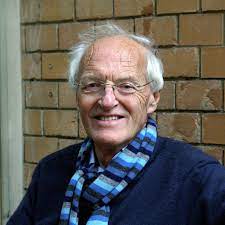
But one might well ask: “What is a native English-speaker in this context?”. Frayn’s translation of Three Sisters was also commissioned, by Caspar Wrede, for production in Manchester, and his principles thus still applied, but what native English-speakers declare their passionate yearnings for returning to Moscow?
I do want to record two important statements made by Hingley and Frayn about the art of translating Chekhov. Hingley wrote:
A tendency to repeat words or phrases is a feature of conversational Russian shared by English, but not to the same extent. Thus, Chekhov’s characters, in moments of frustration, often say Я не могу, не могу [ya ne mogu, ne mogu] (literally, ‘I cannot, I cannot’). Once again the mechanical reproduction in English of a feature of the Russian is not necessarily always consistent with the spirit of the original – though there are of course occasions when it is. For example, the above phrase is probably better rendered as something like ‘I can’t stand it, I tell you, rather than by ‘I can’t stand it, I can’t stand it’.
And Frayn:
Another considerable problem for the translator is finding consistent equivalents for the many recurring words and phrases. The hardest – and most ubiquitous – is vsyo ravno and its variants, which I have rendered as ‘It doesn’t matter’. ‘It’s all the same’ would be closer, but is less capable of being adapted to all the different situations in which it occurs. The effect of repetition must, I think, in a play where it is used so consciously, take precedence over exactitude.
(I immediately thought of Gilda Radner, and her trope of ‘Never mind’, on Saturday Night Live. Does it take a certain generation – and domicile – to appreciate that?)
Comparisons
It is instructive to compare the translations of Fen (1954), Hingley (1964), and Frayn (1987). This could be the subject of a thesis, but I shall cite a couple of examples. In the first scene of Uncle Vanya, where Astrov is complaining about his life, he speaks of the eccentricities of people around him:
(Fen) “This sort of life drags you down. You’re surrounded by queer people – they’re a queer lot, all of them, and after you’ve lived with them for a year or two, you gradually become queer yourself, without noticing it.”
(Hingley) “It gets you down, this life does. You’re surrounded by the oddest people, because that’s what they all are – odd. Spend a couple of years among them, and you gradually turn into a freak yourself, and don’t even notice it.”
(Frayn) “It drags its feet, this life of ours. You’re surrounded by cranks and crackbrains – there’s something odd about the lot of them. Live with them for a few years and gradually, without noticing it, you start getting a bit odd yourself.”
First, it is obvious that Hingley and Frayn wanted to move away from the associations of ‘queer’, the meaning of which had taken a new departure. Hingley also transforms the formal prose of Fen into a more colloquial format, as does Frayn, but then they both introduce sharper slants on the notion of ‘oddness’ – Hingley deploying ‘freak’ (which is surely a bit of an exaggeration), and Frayn using two more extreme nouns, ‘crank’, and ‘crackbrain’, both of which seem inappropriate to me. A ‘crank’ is normally someone with distorted and irrational opinions, while ‘crackbrain’ which goes back to the sixteenth century, suggests insanity. Chekhov was merely suggesting eccentricity, I believe: ‘crackpot’ might be better than ‘crackbrain’. These versions may not be ‘doughy’, but I do not believe they are faithful to the original. Ironically, in Act 2, when Astrov declares that there is not anything odd about him, Fen uses ‘crank’, Hingley deploys ‘freak’, and Frayn returns to simply ‘oddness’. Amazingly, Frayn omits completely some passages that present linguistic challenges, such as the speech impediments of Astrov’s assistant. Hingley is the obvious winner, to me.
Another testing passage appears in Act II of Three Sisters, where Chebutykin and Solyony debate the relative merits of Caucasian food. The joke revolves around the supposed similarities between the words ‘chehartma’ (a meat dish) and ‘cheremsha’ (a kind of onion). It is not a very elegant exchange: Chebutykin is made to spell out for the audience what chehartma is, while it is difficult to see how Solyony could mishear what Chebutykin says (unless he is being deliberately obtuse). But it is a prime example of Chekhov characters speaking at cross-purposes.
Fen is faithful to the original, using the Russian terms. Hingley tries to anglicize the exchange by replacing the foods with ‘escalope’ and ‘shallot’, which is a fairly clever transposition of meat and onions (but might ‘scallions’ have been a better fit?). Frayn reverts to the native Russian of ‘chehartmá’ and ‘cheremshá’, and adds for our benefit the fact that the latter is known as ‘ramson’, which appears to be botanically accurate, but is an extraneous and unnatural insertion that draws the translator into a tangled metaverse. Why would a Russian character translate the native Russian word into English, even if he was supposed to be ‘a native English speaker’? If that is the principle the translator is heeding, the Hingley approach of attempted naturalisation, and not trying to explain too much, is preferable.
One aspect of this process which may have been overlooked is that, in the attempt to render the complete playscript colloquial, the translators do not pay enough attention to the unique registers of each individual speaker (a technique I have complimented John le Carré on). The speech mannerisms of the minor characters in Chekhov are well-defined, but the major characters tend to be more homogeneous – at least in translation. I have not studied the Russian text closely enough to determine whether Chekhov invested much effort into providing distinct speech patterns. For instance, the language of the upstart peasant businessman Lopakhin, in The Cherry Orchard, sounds just like that of his landowning colleagues. (One might have expected him perhaps to have had a ‘suburban’ accent – ‘Del Boy’ Lopakhin, perhaps.) Whether it is truly so in the original, I cannot yet say.
Tarara-boom-de-ay!
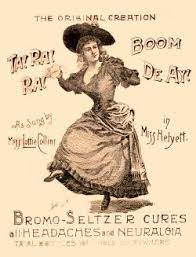
Lastly, the intriguing matter of ‘Ta-ra-ra Boom-de-ay’, the refrain sung by Chebutykin in Three Sisters, as a mere mannerism, or perhaps as a gentle commentary on the absurdity of what is going on. The song, with its suggestive lyrics, dates from 1891, and became popular throughout Europe, even in Russia, but the American originally published version presents the famous line solely as a refrain, with no balancing lyrics.
Constance Garnett leaves the refrain unimproved. Fen represents it as follows: “Tarara-boom-di-ay . . . . I’m sitting on a tomb-di-ay. . . .”, with a rather morbid reference. Hingley, however, introduces a completely different idea: “Tararaboomdeay, let’s have a tune today”, while Frayn presents it as “Ta-ra . . . ra . . . boom-de-ay. . . . Sit in my room all day. . .” Lastly, at the conclusion of his book, Gerhardie describes the scene as follows:
Only a few minutes earlier the old army doctor has been singing softly to himself the well-worn refrain, ‘Ta-ra-ra-boom-de-ay; this is our washing day’ – a trashy tune; which only throws into relief the mood of the three sisters, the most searching of which the human heart is capable.
[Eh?? Hingley would have red-pencilled that last clause.]
So what is going on here? How can these experts be all over the place so haphazardly?
What Chekhov wrote was: “ Tara…ra…bumbia. . . Cizhu na tumbe ya . . . “, but it is not clear whether that is his invention, or whether the song became Russified that way. The second part means, literally, ‘I sit on a bollard’ (i.e. not a ‘tomb’, which is how Elizabeth Fen chose to translate ‘toomba’: she must have fallen in love with the rhyme. Martin Clay would presumably have rebuked her for making a stupid guess.) But where the others get their ideas from is not clear – and how could they claim that their versions were faithful to the original?
I suspect that several parodies, or imitations, were going round over the decades. I recall Martin Clay reciting to us that the second part of the refrain went: ‘I washed my socks today’, which sounds like some barrack-room jingle dreamed up by overworked JSSL pupils at Caterham-on-the-Hill perhaps, although it echoes Gerhardie’s creation from the 1920s. But why not come up with something that resembles the original? My mind went immediately to George Formby and Leaning on a Lamp-post, since perhaps Chekhov’s idea was perhaps that boulevardiers would sit on a bollard and watch all the girls go by.
Yet Chekhov might have wanted to suggest that it was the singing of the refrain by an alluring woman that fascinated him. The fact that it had a connotation of the original sexual attraction for him is shown by a letter he wrote to Leontiev Shcheglov in December 1896, after Shcheglov had advised him to get married. Chekhov specified that his future wife should be ‘a blue-eyed actress singing Tara-ra-boom-de-ay’ (Rayfield, p 410). The writer was apparently irresistible to women, with his quizzical, humorous and ambiguous manner, but he led a dissolute bachelor life, and treated all his admirers very badly. He was eventually tamed and charmed by Olga Knipper (who reportedly had ‘small eyes and a large jowl’), and married her. I thus look out eagerly for a new translation that does justice to the matter. But where are you, Ronald Hingley, when we need you and your insights?
(New Commonplace entries viewable here.)
Postscript: November 20, 2022
I have since read Donald Rayfield’s ‘Understanding Chekhov’, and find that he writes (on page 214, in his chapter on ‘Three Sisters’) the following:
“The third English (or American) element which had already served Chekhov as a leitmotiv in the story ‘Big Volodia and Little Volodia’ was the music-hall song ‘Tarara-boom-deay’, which spread from America in 1891 to all Europe in countless variations. In English (and in French) its verses were sung by a louche schoolgirl (‘Not too shy and not too bold, Just the sort for sport I’m told’), while an enthusiastic male chorus sings ‘Tarara-boom-deay’. In Chekhov’s work the refrain became a euphemism for sexual intercourse. In Russian versions the text was sadder. The main verse might be the story of a man fallen into depravity and the chorus a bitter lament. The song, however, was orchestrated and became an artillery regimental march. Undoubtedly, the officers of Chekhov’s fictional battery, as they leave the northern town where they have enchanted, and disenchanted, the three sisters, march out to the tune of ‘Tarara-boom-deay’, the very song that Dr Chebutykin sings (as all Chekhovian males sing songs) to heighten the distress of the heroine to whom it applies.” Rayfield points out that Chebutykin sings the refrain at the death of Tuzenbach from a duel, thus increasing Irina’s distress.
